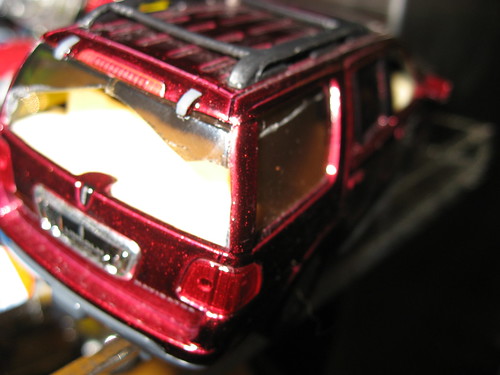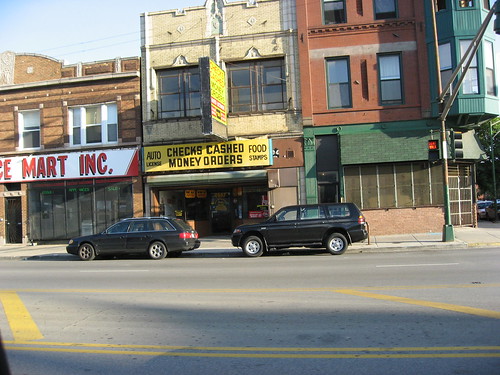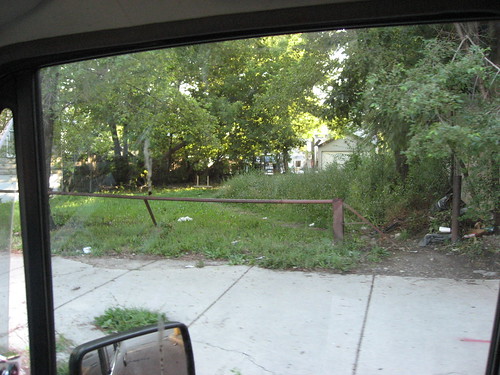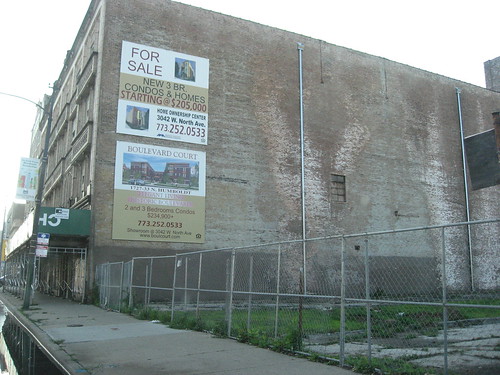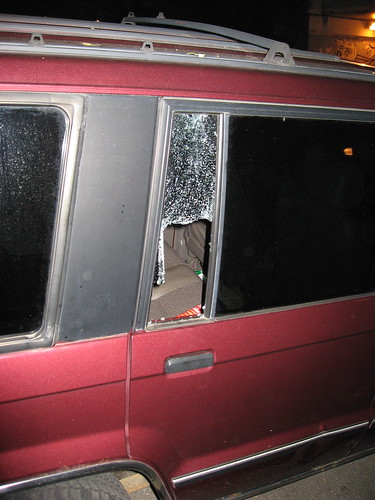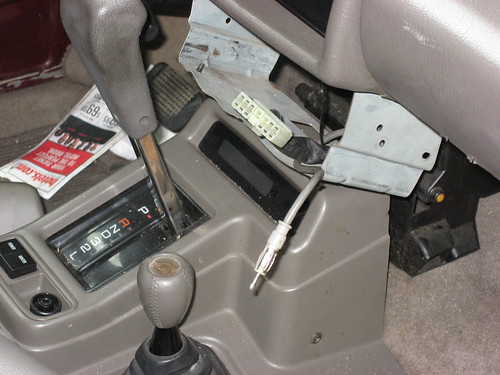- GET SLEEP
- GET NEW SHOES (which I did)
- don't be angry at white people :) (but apparently i need to watch a bunch of shitty movies and listen to shitty 80s music)
Viewing entries in
My Chicago Summer 2006
- There are seven players in the back line on stage
- One person initiates a solo scene (player A, scene 1)
- A new person enters the stage and created an new scene (scene 2, with player A and player B)
- A new person enters the stage, creating a third, different scene (scene 3, with player A, B and C)
- Remember, player A is a completely different character in Scene 1, Scene 2 and Scene 3
- We do this until the seventh player created scene 7 and finds some reasonable excuse for his character to leave the scene
- Then we return to some LATER POINT in Scene 6 until the player that initiated Scene 6 finds an excuse to exit
- The same applies to Scenes 5 through 1
- So the game ends with a solo player (player A, scene 1, later in the plot of scene 1)
- Another Rule (this is #6, building on the five we got on Monday): Use Your Actual/Real Emotions in Your Scenes. If you're nervous, use that!
- If you are listening for the audience to laugh, you are not in your scene. This rule came as a response to something Gabe said. I'm not sure it quite applied to his statement, but I get the point. If the audience laughs, great, but don't let the audience lead or define the scene. Let the relationship between the characters and/or the ongoing game define the next step. Sweet. I think I learned something!
- It's brave to be quiet in improv. Harold Pinter is a playwright who devoted about 40 percent of his plays to silence
- Use your environment. It gives you something to do if you have nothing to say.
- Go for three things in the transformational opening
- Listen, listen, listen
- Make eye contact with your fellow players
- Have fun
- Give yourself a gift, and maintain it throughout the scene
- The scene is about the relationships between characters, NOT THE OBJECTS YOU'VE CREATED!
- Agree. Don't Argue. Two characters arguing is not interesting to watch. With agreement, you can build an actual conversation.
- If You Don't Know What to Say, DO Something. We are not just talking heads on stage. We can use the space, our bodies and objects in the environment we've built (e.g. ironing, sharpening a blade whilst (shoutout Jessica) saying "I love you")
- If You're Not Having Fun, You're the Asshole. Always, always have fun. This rule is about judgement and avoiding it. Avoid judgement of your own moves in a scene and those of your scene partner. Accept it and move forward. Rachael: "JUDGEMENT IS THE ENEMY OF IMPROV"
- You, The Person, is Incredibly Important. Invest in yourself. Read. See movies. Know what books are on the NY Times Bestseller's List. This will contribute to what we can bring to our scenes and characters. I'm so glad she mentioned this one. I've found this helping so much as a comedian who talks about current affairs so much. I will watch crappy TV because I know my audiences do, and I need to relate. Pop Culture is a language (as is Science, Art, Etc)
- Don't Beat Yourself Up Over the Last Shitty Improv Scene. Related to #3, the show is much bigger than your last scene. Move forward. Someone else might pick up what you thought was shitty and turn it into something beautiful.
- Our characters have lives before and after a scene. They have secrets and emotions. Bring this information into the scene. It makes things more interesting. Give yourself the gift of this knowledge or trait
- Try out accents. It makes things fun.
- Ask questions about your character: young v. old, Barry White v. Barry Manilow
- Try not to lock in on your own idea going into a scene because no scene is ever fully your idea since you also have a scene partner who doesn't think like you.
- Don't play stereotypes or archetypes. Just play types. A scene with two gay men should not be flamboyant. Make it about a real relationship. I'd add that a scene about black folk doesn't have to be about Hip Hop or gangs (stereotypes) but can treat the characters as real people having relationships. Are the gangster's studying for a tough final exam?
photo by me via Flickr (click on pic to view more)
I've been in Chicago for one week now and, for the most part, it's been really positive. The day I arrived, George W. Bush left town. That's always a good sign. Maybe I should move back to D.C.? My studies at the Improv Olympic are going great. I figured out the El and have made a bunch of new friends.
Of course, I've got my share of small complaints. It's hot as heyall; the six-way intersections have got to go; and, while it's true that Boston has really bad drivers, Chicago has really deadly drivers. People here treat red lights like ideas they just don't happen to believe in.
The low point, though, was last Friday at 1:30am when I found my car broken into. As is my custom, I can't just tell you the details of the incident. I need to touch on urban development, gentrification, class transcendence and common sense. Prepare yourself.
I have been to a shit-ton of American cities over the course of my life, but especially over the past seven years. Boston (obviously), New York, San Francisco, Portland, LA, Tacoma, DC, Lansing, Austin, Chicago. Even the cities I haven't seen recently, I've experienced through college friends who landed there post-graduation. Almost all of these cities share a major storyline: urban (re)development. The slums are getting a makeover, becoming home to high-priced condominiums.
After the riots of the 60s and 70s, white people left cities. After the crack wave of the 80s, the few remaining bounced too. They fled to the suburbs which became the ex-urbs. Commuting time grew from 30 minutes to and hour to sometimes two hours in each direction. Meanwhile the innercities were largely underinvested and left to decay. I'm not sure what turned the tide -- maybe the excessive commute and distance from a city center became too much or land got more expensive outside the city -- but in the late 1990s, people started talking about the return to the city.
My own neighborhood in D.C. bears this out. My mom packed me and the dog up in the summer of 1991 after the beating, shooting and dealing became too stressful for a single mother with a teenaged black boy. For a few years later, things in the old hood didn't improve, but I've gone back in 2000, 2005 and just a few months ago, and there are now two nice white people from Iowa renting a renovated version of our old basement for the price of the mortgage payments my mom was making.
When money comes back to the city, however, it's not a simple binary transfer from hood to neighborhood. See the recent Americablog post about how the tension between old school and new school can lead to disastrous and deadly consequences.
The Chicago Version
I forgot all these things when I came to Chicago. I'm staying with a friend who lives in West Bucktown (2600 W, 1700 N for those who know the lingo), on the edge of Humboldt Park. His landlord was telling me that 10 years ago, the neighborhood was maybe 20 percent black, 70 percent Latino and 10 percent white. Now it's 10 percent black, 50 percent Latino and 40 percent white. Walking around, it doesn't feel dangerous at all, but it just feels a little hood-ish. Anytime your major retail options are no-name groceries that end in "-Mart", check cashing places, auto body shops and laundromats, you're in something more on the hood side of the neighborhood-hood spectrum.
There are plenty of boarded up homes and abandoned lots around too.
At the same time, people are selling condos for $200K and even $300K+, and you can't pass a block without seeing some sign promising a new condo unit "Coming Soon" right across the street from the check-cashing spot. The trend isn't limited to pseudo-hoods like west Bucktown either. I got to see some of the South Side, and it's starting to happen there too.
So what does this have to do with my car stereo getting jacked? Well, I let my guard down. I haven't lived in a hood in a really long time. I left DC in 1995 and left the place with the shootin in 1989. My friend Glenn said I got soft. I had a removable faceplace on my stereo, but did I remove it? Noooooo. I was no longer living in a world where I assumed people were assholes. I assume politicians are assholes, but not my neighbors.
Why didn't other cars get broken into? Because I was the new car, I had out of state plates, and I had a cheap but nice looking head unit.
What Did They Steal?
Oh, and I had let the car sit in the same spot, un-accessed from Sunday through Thursday. So here's how it went down. They broke the rear passenger side fixed window (thanks for breaking the cheapest one guys!) and unlocked the door. Then a thorough search of the car revealed the following must-have list:
- must break window to enter car ($40)
- sony head unit ($130)
- portable TomTom GPS 300 ($600). I know, if it's portable, why did I leave it in the car? to my credit, I hid it in a seat pocket, but I acknowledge the dumbness of that,
- car chargers for iPod and cell phone ($45)
- roll of quarters ($10). for laundry? tolls?
- $10 bill ($10)
- Tupac CD I hadn't ripped to iTunes yet ($10)
- the cover for my spare tire with a Deval Patrick for Governor sticker on it ($10). They were trying to take the spare but gave up
All told, that's $865 worth of stuff I lost, but the only real things of value are the stereo and the GPS. The stereo I consider acceptable. The GPS I had disabled by the company that made it.
They left my EZ-Pass/Fast Lane toll booth billing thingy, laundry detergent and most importantly, THE CAR.
They also broke the cheapest window and did a clean job of removing the stereo.
Basically, I forgot where I was. I can't just be stupid happy guy with his cool, political, pink t-shirt and iPod blocking out the world and car not moving and valuable shit exposed to the world. It was an expensive reminder but also one that I needed.
So thank you burglars. Oh, and if you mess with my car again, I'll firebomb the whole goddamned neighborhood. :)
I'll be emceeing the 2nd Annual MBAdiversity Symposium & Social in a few weeks in Chicago. It's for folks in business school or people thinking about going. The goal of the organization is to diversify the MBA world. I agree with that goal. White guys shouldn't be the only people indicted for securities fraud!
 Photo by me via Flickr (click on photo for more)
I know that provocative title will get the right wing upset and my regular readers confused, and I promise to explain by the end of this post. Bear with me. Day 4 of my Improv Olympic summer intensive was beautiful. We pulled off a mini-Harold!
Improvisors make no money
We started off Thursday with a positively inspirational lesson from Professor Jessica: improvisors make no money. Great. Now I'm pursuing two forms of comedy that don't pay!
When improv teams perform at the iO, for the most part, they're not being paid. Here's how the improvisor maketh the loot:
Photo by me via Flickr (click on photo for more)
I know that provocative title will get the right wing upset and my regular readers confused, and I promise to explain by the end of this post. Bear with me. Day 4 of my Improv Olympic summer intensive was beautiful. We pulled off a mini-Harold!
Improvisors make no money
We started off Thursday with a positively inspirational lesson from Professor Jessica: improvisors make no money. Great. Now I'm pursuing two forms of comedy that don't pay!
When improv teams perform at the iO, for the most part, they're not being paid. Here's how the improvisor maketh the loot:
- Start your own show, rent the theatre space, negotiate a cut of the door and pray
- Do corporate gigs. The Improv Asylum in Boston is a good example
- Perform on the Second City Mainstage (oh, ok! that's all??) since those players get paid
- Go on tour with Second City (again. knowing this makes life easy)
- Teach improv
- get a job, any job
Came home last night to find my car was broken into. They stole my new, cheap ($150) stereo head unit. And my GPS which was in the seat pocket. Will post more details later. Am on the phone with la policia. I'm more annoyed than anything cause now I have to deal with insurance, replacing a window pane, my tint job has to be redone on that one and I need to replace the electronics! The stereo loss is irritating. The GPS is expensive. Damn.
 photo by *Jake via Flickr
Today we started putting the pieces together and went on a little emotional low-high streak. We learned an opening called "The Invocation," did a 30 minute version of "The Armando" and played a cool game just before the end of class that tested all sorts of coordination. After three days of intensive, all-day improv, we've done "six weeks" in real time terms.
Well, there went our confidence
Day 2 was all about us reporting on how we felt after our scenes, and most of us were really critical. Jessica actually complained about it, saying we were doing amazing work and should be more confident. Last night, several of us joked about showing up this morning and just being a bunch of arrogant bastards, but by lunchtime, we lost all that bravado.
The structure the long form improvisation done at the Improv Olympic is called "The Harold." The shows last about 30 minutes and consist of several parts, starting with a theme, word, place or some other such input from the audience. Step one for the players is to build a three to five minute "opening" which is designed to take that word (let's say it's a "spatula") and get at its full meaning. As teacher Jessica would say, "it's to turn that 'pebble' into The Universe... to turn 'vibrator' into Women's Lib."
Improv groups use all sorts of methods to explore the meaning of the spatula, from songs to weird contortionism. Jessica taught us a method called "The Invocation," and it has four phases.
photo by *Jake via Flickr
Today we started putting the pieces together and went on a little emotional low-high streak. We learned an opening called "The Invocation," did a 30 minute version of "The Armando" and played a cool game just before the end of class that tested all sorts of coordination. After three days of intensive, all-day improv, we've done "six weeks" in real time terms.
Well, there went our confidence
Day 2 was all about us reporting on how we felt after our scenes, and most of us were really critical. Jessica actually complained about it, saying we were doing amazing work and should be more confident. Last night, several of us joked about showing up this morning and just being a bunch of arrogant bastards, but by lunchtime, we lost all that bravado.
The structure the long form improvisation done at the Improv Olympic is called "The Harold." The shows last about 30 minutes and consist of several parts, starting with a theme, word, place or some other such input from the audience. Step one for the players is to build a three to five minute "opening" which is designed to take that word (let's say it's a "spatula") and get at its full meaning. As teacher Jessica would say, "it's to turn that 'pebble' into The Universe... to turn 'vibrator' into Women's Lib."
Improv groups use all sorts of methods to explore the meaning of the spatula, from songs to weird contortionism. Jessica taught us a method called "The Invocation," and it has four phases.
- IT IS. In phase one, members of the group describe what they see in response to the word/object suggested. The description is precise, and it builds cumulatively. So, if the word is notebook, and person A says "it is a three ring binder," person B says, "it is completely red," person C is NOT allowed to say it's a blue Dell "notebook" computer. The group builds a common, physical definition together.
- YOU ARE. In phase two, we each make a personal connection to the suggestion. These do not have to build or be consistent across the players. I might say (to the object itself), "You are where I kept my life goals."
- THOU ART. This phase is similar to "YOU ARE" but rather than being personal, it's meant to be metaphorical or philosophical. For example, building on the personal YOU ARE, I might say (to the object), "thou art a dreamcatcher."
- I AM. Finally, we become the object. With I AM, we look for one word or phrase that captures the essence of the suggestion. "I am hope," I might say as the notebook.
- Audience provides suggestion
- A monologist (referred to as the Armando) tells a TRUE story related to the suggestion. He stops after a minute or two
- Players create scenes inspired by the audience suggestion and the story of the Armando. They comment on the story
- When the scenes feel exhausted, the Armando returns with another story, possibly integrating themes from the previous scenes
- More scenes
- Another monologue
- this could go on forever, but it doesn't. Eventually, the Armando gives a final monologue which tries to touch on many of the subsequent themes raised in the scenes.
 photo by aphasiafilms via Flickr
Day 2 of my Improv Olympic summer intensive focused on interactive monologues and character wants and needs. Today went by so very fast, so I know it was a good one.
A Scene is Like a Road Trip
In the morning, we spent almost the entire time doing what are called "interactive monologues." In this case, three people sit on stage in chairs facing the audience. They're lined up in a single row, and are supposed to begin a conversation with a non-existent person based on an audience suggestions which are different for each speaker. There's no chosen order to speak, so the first person starts whenever, and the second one begins when it feels right. The second speaker's one-sided conversation is inspired by the audience suggestion and the first speaker. The same is true of the third who is inspired by both prior speakers and his own audience suggestion.
Then our fearless teacher Jessica has the three speakers turn to face each other, continuing their disparate conversations but this time interacting directly with the other speakers on the stage as if they were involved in a direct conversation. Everyone thinks they are talking to the people on the stage, but we all interpret the words a bit differently based on our own personal conversations.
Here's an example. I was given the term "Rocket" to build my conversation. I made the conversation be between me, a night club promoter, convincing people to come in and see the headlining band, "Rockit!" The club was in the Sahara Desert for some reason. Later, when the three speakers turned in to face each other, another woman was having her conversation about her baby and said something to me about how she didn't want her kid to die. I explained that I was saying the band, Rockit, was "KILLER."
I'm not doing the exercise justice, but it was amazing to see how a group of people talking about very different things could 1) use themes from others' conversations to enhance their own and 2) talk directly to each other without quite talking to each other. On some level, we were all talking about the same thing.
Jessica also passed on a great advice from a talented improver named Joe Bill. It's about exploring the nooks and crannies of a scene but making sure you somehow stick to the underlying plot line. His take was this: A scene is like a road trip. You need to leave the road occasionally for gas, food, etc. But you have to remember where you were going and eventually get back on the road.
Good advice.
The second game we played was a twist on a more common one. The common version has you focus on your pet peeves with "I hate X because..." Instead we played "I love X because..."
Show. Don't Tell.
The final game was mos def the illest! The setup was two people who each has a want/need/desire to be fulfilled by the other. The trick is they can't just tell the other person what they want. Their characters need to communicate it be creating a relationship and showing the other, such that person two figures it out and gives it to them... or chooses not to.
Two people got on stage reached to pull a piece of paper from a cup. They would then turn those papers over to Jessica who sent the to the bathroom. She clued the rest of the class/audience in on what their secret wants were, then brought the two players back out. The matchups of secret wants was hilarious at times. In one case, person A wanted to be talked out of suicide and person B wanted someone to confide in him.
In my own case, I wanted a hug and my partner, Leanne, wanted to know the meaning of life. Each pair was given a location as well. Ours was a weight room.
This exercise was the height of my improv experience so far. I felt very lost within the scene, having a hard time balancing my attention between listening to Leanne and figuring out what relationship we had that could make her want to hug me. By the end she was expressing complete sympathy and we had moved really close to each other. I put on one of the saddest faces ever, with Jessica saying it was a high moment in HER improv experience, but I didn't get the hug. I also wasn't really sure I knew what Leanne wanted.
When the scene was over, the entire audience was pretty amazed because we both had essentially gotten what we needed, if not in a literal way, a very close approximation. I got an emotional hug from Leanne who did everything except wrap her arms around me. And in talking with her, she got from me some deeper understanding of the universe and energy. I had, apparently, come quite close to satisfying her need as well.
Watching and being a part of this game honestly scared the hell out of me because it shouldn't work. We demonstrated that humans communicate with one another on a subconscious level, to say the least. What we can't put into precise words, we put into body language, emotion and indirect words. Somehow, we are able to connect with others in a way that builds mutual understanding. If this had happened one or two times, I would have thought it was neat, but it happened seven times with different needs and different people.
This work is so inspiring.
photo by aphasiafilms via Flickr
Day 2 of my Improv Olympic summer intensive focused on interactive monologues and character wants and needs. Today went by so very fast, so I know it was a good one.
A Scene is Like a Road Trip
In the morning, we spent almost the entire time doing what are called "interactive monologues." In this case, three people sit on stage in chairs facing the audience. They're lined up in a single row, and are supposed to begin a conversation with a non-existent person based on an audience suggestions which are different for each speaker. There's no chosen order to speak, so the first person starts whenever, and the second one begins when it feels right. The second speaker's one-sided conversation is inspired by the audience suggestion and the first speaker. The same is true of the third who is inspired by both prior speakers and his own audience suggestion.
Then our fearless teacher Jessica has the three speakers turn to face each other, continuing their disparate conversations but this time interacting directly with the other speakers on the stage as if they were involved in a direct conversation. Everyone thinks they are talking to the people on the stage, but we all interpret the words a bit differently based on our own personal conversations.
Here's an example. I was given the term "Rocket" to build my conversation. I made the conversation be between me, a night club promoter, convincing people to come in and see the headlining band, "Rockit!" The club was in the Sahara Desert for some reason. Later, when the three speakers turned in to face each other, another woman was having her conversation about her baby and said something to me about how she didn't want her kid to die. I explained that I was saying the band, Rockit, was "KILLER."
I'm not doing the exercise justice, but it was amazing to see how a group of people talking about very different things could 1) use themes from others' conversations to enhance their own and 2) talk directly to each other without quite talking to each other. On some level, we were all talking about the same thing.
Jessica also passed on a great advice from a talented improver named Joe Bill. It's about exploring the nooks and crannies of a scene but making sure you somehow stick to the underlying plot line. His take was this: A scene is like a road trip. You need to leave the road occasionally for gas, food, etc. But you have to remember where you were going and eventually get back on the road.
Good advice.
The second game we played was a twist on a more common one. The common version has you focus on your pet peeves with "I hate X because..." Instead we played "I love X because..."
Show. Don't Tell.
The final game was mos def the illest! The setup was two people who each has a want/need/desire to be fulfilled by the other. The trick is they can't just tell the other person what they want. Their characters need to communicate it be creating a relationship and showing the other, such that person two figures it out and gives it to them... or chooses not to.
Two people got on stage reached to pull a piece of paper from a cup. They would then turn those papers over to Jessica who sent the to the bathroom. She clued the rest of the class/audience in on what their secret wants were, then brought the two players back out. The matchups of secret wants was hilarious at times. In one case, person A wanted to be talked out of suicide and person B wanted someone to confide in him.
In my own case, I wanted a hug and my partner, Leanne, wanted to know the meaning of life. Each pair was given a location as well. Ours was a weight room.
This exercise was the height of my improv experience so far. I felt very lost within the scene, having a hard time balancing my attention between listening to Leanne and figuring out what relationship we had that could make her want to hug me. By the end she was expressing complete sympathy and we had moved really close to each other. I put on one of the saddest faces ever, with Jessica saying it was a high moment in HER improv experience, but I didn't get the hug. I also wasn't really sure I knew what Leanne wanted.
When the scene was over, the entire audience was pretty amazed because we both had essentially gotten what we needed, if not in a literal way, a very close approximation. I got an emotional hug from Leanne who did everything except wrap her arms around me. And in talking with her, she got from me some deeper understanding of the universe and energy. I had, apparently, come quite close to satisfying her need as well.
Watching and being a part of this game honestly scared the hell out of me because it shouldn't work. We demonstrated that humans communicate with one another on a subconscious level, to say the least. What we can't put into precise words, we put into body language, emotion and indirect words. Somehow, we are able to connect with others in a way that builds mutual understanding. If this had happened one or two times, I would have thought it was neat, but it happened seven times with different needs and different people.
This work is so inspiring.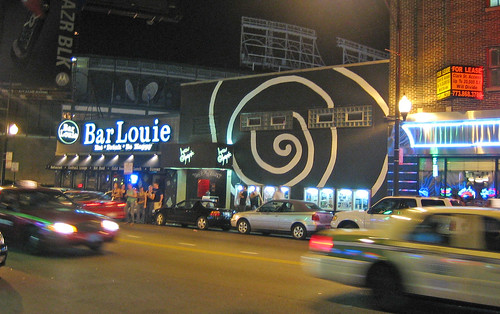 photo by strzelecki1 via Flickr
As many of you know, I'm in Chicago this summer, primarily to study improvisational comedy with the good folks of Improv Olympic. I'll try to blog a lot about what I'm learning, what's cool, what's weird and whatever else I can think of. As always, if you have comments or questions or things you want to hear about, hollaback in the comments.
Day 1. I'm seven minutes late.
I don't know what made me think that I could visit any government office and be out in 10 minutes, but I assure you, that will never happen again. I spent Sunday night researching the best way to get around town. It was my plan to keep the car parked as much as possible and experience the L. However, I still had to decide what sort of pass I would get. I settled on an unlimited 30 day joint called the Chicago Card Plus, and headed downtown because you have to buy these in person.
There were about 15 people in front of me in line, and the workers behind the glass (I'm SURE it's bullet proof, and after waiting 40 minutes, I'm SURE I know why) had absolutely no focus. They would deal with someone in front of them for a minute, then take a call, then talk amongst themselves and repeat that cycle. I waited in the actual line for maybe 20 - 25 minutes. When I got to a window, she gave me some paper form to fill out. Why weren't those available to fill out why I was waiting?? Because that makes too much damned good sense, that's why!
So I filled out the form, handed it to the attendant, only to have her type in exactly what I wrote down. Yo, I could have done that myself!
I finally got the card at 10:45, and class starts at 11am. I was downtown, and class is up by Wrigley Field. I took a cab. $20. Thus negating MUCH of the savings of the pass I had just bought.
Day 1: I'm a genius
I rolled in a few minutes late but in time to hear the last part of iO co-founder Charna Halpern's kickoff speech.
"Improv is a thinking man's game. It's like chess. You are all geniuses."
I like this gig already. You should read a little more about the iO over here or here, but the basics are that this school focuses on improv just for the art of it, not as a tool to create sketch comedy, for example. Some notable alumni include Tina Fey (oooh la la), STEPHEN COLBERT, Tim Meadows and Chris Farley.
There are between 40 and 50 people in the summer program, divided into three sessions. I'm in session one with 13 other people from all over the place. Steve is from London. Karen is from Boise, Idaho. Eric is from Holland. Sarah and her brother, Nick, are from Ottawa. There are even a few New Yorkers. Our fearless teacher for Week 1 is Jessica.
We spent the day doing what I can only describe as playing, and it was mad fun. Jessica gave us increasing amounts of freedom in our two-person scene work throughout the day. In the beginning, she told us who our characters were, and she told us when to stop the scene. By the end of the day, we were deciding both all on our own.
Day 1: Highlights
The day focused a lot on connections and character relationships. We did exercises that forced us to eavesdrop on others' conversations while being engaged in our own so we could learn to pay attention to what's happening on stage and integrate it into our own actions. We were thrown into alien situations with a scene partner and had to instantly demonstrate a history and explore the meaning of that relationship.
here are some of the cool, weird, funny and interesting things I remember.
photo by strzelecki1 via Flickr
As many of you know, I'm in Chicago this summer, primarily to study improvisational comedy with the good folks of Improv Olympic. I'll try to blog a lot about what I'm learning, what's cool, what's weird and whatever else I can think of. As always, if you have comments or questions or things you want to hear about, hollaback in the comments.
Day 1. I'm seven minutes late.
I don't know what made me think that I could visit any government office and be out in 10 minutes, but I assure you, that will never happen again. I spent Sunday night researching the best way to get around town. It was my plan to keep the car parked as much as possible and experience the L. However, I still had to decide what sort of pass I would get. I settled on an unlimited 30 day joint called the Chicago Card Plus, and headed downtown because you have to buy these in person.
There were about 15 people in front of me in line, and the workers behind the glass (I'm SURE it's bullet proof, and after waiting 40 minutes, I'm SURE I know why) had absolutely no focus. They would deal with someone in front of them for a minute, then take a call, then talk amongst themselves and repeat that cycle. I waited in the actual line for maybe 20 - 25 minutes. When I got to a window, she gave me some paper form to fill out. Why weren't those available to fill out why I was waiting?? Because that makes too much damned good sense, that's why!
So I filled out the form, handed it to the attendant, only to have her type in exactly what I wrote down. Yo, I could have done that myself!
I finally got the card at 10:45, and class starts at 11am. I was downtown, and class is up by Wrigley Field. I took a cab. $20. Thus negating MUCH of the savings of the pass I had just bought.
Day 1: I'm a genius
I rolled in a few minutes late but in time to hear the last part of iO co-founder Charna Halpern's kickoff speech.
"Improv is a thinking man's game. It's like chess. You are all geniuses."
I like this gig already. You should read a little more about the iO over here or here, but the basics are that this school focuses on improv just for the art of it, not as a tool to create sketch comedy, for example. Some notable alumni include Tina Fey (oooh la la), STEPHEN COLBERT, Tim Meadows and Chris Farley.
There are between 40 and 50 people in the summer program, divided into three sessions. I'm in session one with 13 other people from all over the place. Steve is from London. Karen is from Boise, Idaho. Eric is from Holland. Sarah and her brother, Nick, are from Ottawa. There are even a few New Yorkers. Our fearless teacher for Week 1 is Jessica.
We spent the day doing what I can only describe as playing, and it was mad fun. Jessica gave us increasing amounts of freedom in our two-person scene work throughout the day. In the beginning, she told us who our characters were, and she told us when to stop the scene. By the end of the day, we were deciding both all on our own.
Day 1: Highlights
The day focused a lot on connections and character relationships. We did exercises that forced us to eavesdrop on others' conversations while being engaged in our own so we could learn to pay attention to what's happening on stage and integrate it into our own actions. We were thrown into alien situations with a scene partner and had to instantly demonstrate a history and explore the meaning of that relationship.
here are some of the cool, weird, funny and interesting things I remember.
- I was thrown into a scene where me and a guy named Jeff were showing up at the same house to pick up the same woman for a date. Jeff's first statement to me: "are you here to deliver something?" "Yes I am. I'm here to deliver flowers for my date tonight." Later in the scene, Jeff mentioned that he saw our date (Laura) in line at the unemployment office. "That's disappointing," I said. "Why?" "Because she promised me a lot of her lawyer money." "What's that?" "Well, Laura works at a pretty unique law firm. They have clients and documents and stuff, but they also have a big pile of lawyer money, and she was going to give some to me." I have no idea what I was talking about, but it was fun!
- An election for president of a sixth grade class led to riots in the school and chewing gum in all the kids' hair
- A daughter was forced by her overly stringent mother to fax her mom the pizza order from downstairs so her mom could review it


